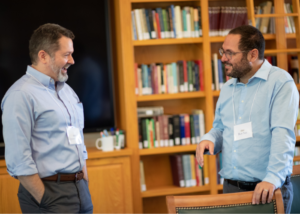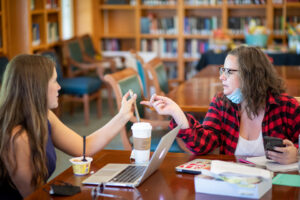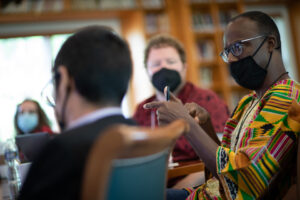
In July ICJS Jewish Scholar Ben Sax co-led Faiths & Ferocity, the inaugural ICJS Faculty Seminar with Kate Temoney, associate professor in the Department of Religion at Montclair State University. The seminar brought together scholars working in the fields of interreligious studies or genocide studies in the ICJS Library for an intensive week of study and fellowship.
Q: What can we learn from looking at interreligious studies and genocide studies together?
Both disciplines have something to offer about understanding the greater human experience and what it means to be a human being. Actually, genocide studies offers a very interesting way into interreligious studies because it shows what we call the aporia or the paradox of what it means to be human: To be human is to make a mistake. But then we also use the word ‘humanity’ as a way of describing something superhuman. So how is it that we’re both superhuman and also prone to mistakes simultaneously? Genocide studies looks at the darker aspects of that. Interreligious studies builds on that as a way of trying to create effective spaces for dialogue. And so our hope is that people bring these experiences back to their classrooms and universities to create more productive and meaningful spaces for interreligious engagement.
Q: What themes emerged during the Seminar?
 We explored the problem of colonialism and its expression in Supersessionism [the theology that the New Covenant through Jesus Christ replaced the Mosaic covenant] and the related unholy alliance between reason, religion, and race that mutually reinforced one another. One of the things that came out of these conversations was that even during the Enlightenment, at the time when people focused primarily on reason as way of engaging science and truth and other human beings, there was a surreptitious way of othering—and justifying that othering—because of the idea that some people had more capacity to reason than others. To be a human meant to reason. But if you say that some people reason less, they become less human. So we explored some of those relationships. We also explored how religion can be the cause and the repair for the sort of damage that comes from this violence.
We explored the problem of colonialism and its expression in Supersessionism [the theology that the New Covenant through Jesus Christ replaced the Mosaic covenant] and the related unholy alliance between reason, religion, and race that mutually reinforced one another. One of the things that came out of these conversations was that even during the Enlightenment, at the time when people focused primarily on reason as way of engaging science and truth and other human beings, there was a surreptitious way of othering—and justifying that othering—because of the idea that some people had more capacity to reason than others. To be a human meant to reason. But if you say that some people reason less, they become less human. So we explored some of those relationships. We also explored how religion can be the cause and the repair for the sort of damage that comes from this violence.
Another theme we explored was the role of hope when studying genocide. People who study genocide are often asked, ‘Where are the places that you find hope?’ We explored whether looking for hope was essentially a Christian motif because for the non-Christians in the room, there wasn’t a particular desire to find hope in this work. In fact, the future-oriented work of preventing genocide isn’t necessarily tied to this category of hope. That in fact, for some people, even asking the question ‘Where do you find hope’ in the study of genocide is unethical because genocide itself doesn’t really open up any avenues for hope, since genocide is the complete opposite. It’s the absence of hope.
Q: Why is it important for scholars to gather in a seminar format?
The academic calendar is not really set up for dialogue or communication. It’s more a situation of alienated labor and isolated work. And there’s a certain irony there, being an educator and doing the work of knowledge production, that you wouldn’t be part of a broader community. You teach your courses, you do your research, but engagement—serious engagement with other scholars—is fairly limited.
These faculty seminars are designed for scholars to go very deep into their work, as a community and strategically. So four days is a long time. But it’s necessary because we need to build these relationships and ask these deep questions for us to really be successful in our own academic work and lives.

